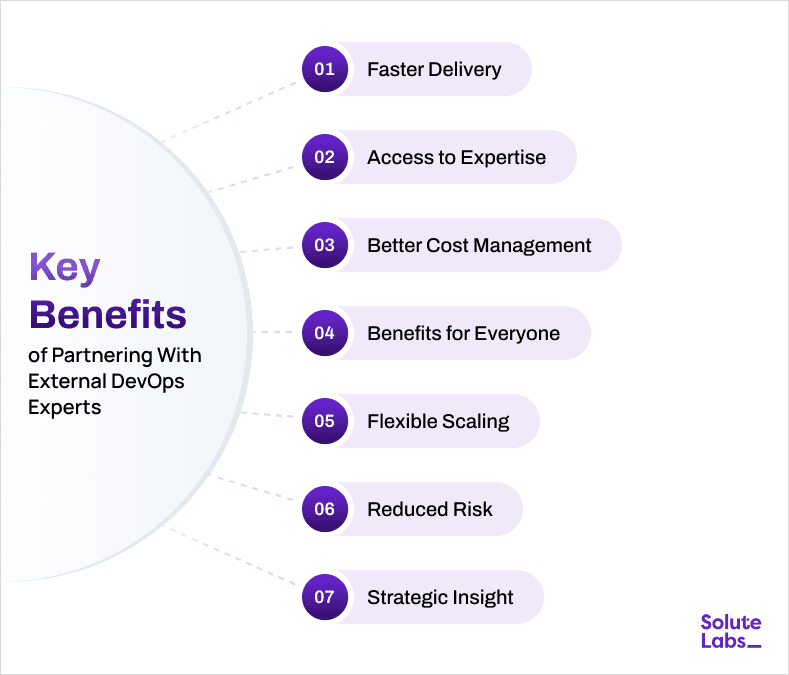Today's businesses are constantly under pressure to maintain system reliability, ship more quickly, and resolve problems quickly. The market demonstrates the gravity of this.
DevOps outsourcing market was valued at over $10.4 billion in 2024 and is predicted to continue expanding at a rate of almost 20% annually for the foreseeable future. That is an obvious indication that companies are using DevOps extensively to maintain their competitiveness.
The issue is that it's difficult to assemble a capable DevOps team inside. Professional engineers are costly, difficult to recruit, and even more difficult to retain. Instead of streamlining their operations, many businesses find themselves caught in a never-ending firefighting cycle. This is where DevOps services that are outsourced can really help. Businesses can leverage pre-made knowledge, quicker delivery pipelines, and more dependable systems by bringing in outside specialists. Giving your team space to concentrate on what really matters, the product and the customer, is more important than reducing expenses.
This blog post will explain what outsourced DevOps is, how it benefits various teams, and how to determine if it's the best course of action for your company.
What Outsourced DevOps Actually Means?
When people hear outsourced DevOps, they often think it’s just about someone else keeping servers up. It’s not that simple. What it really means is bringing in a partner who knows how to remove the bottlenecks between developers writing code and customers actually using it.
At SoluteLabs, the idea is straightforward: slot into your team, understand how you work, and then take charge of the messy but critical parts of pipelines, cloud setup, monitoring, and security. Sometimes it’s about getting a young startup to ship faster. Other times, it’s helping a growing company avoid wasting thousands on cloud costs.
So, outsourced DevOps services with SoluteLabs aren’t an off-the-shelf package. They’re flexible, hands-on support that lets your team focus on building the product while someone who’s done it before keeps everything running smoothly in the background.
How Outsourced DevOps Can Propel Your Business Forward?
DevOps outsourcing is more than just assigning tasks you don't want to undertake. It's about advancing your company more quickly than you could by yourself. It could take your team years to develop the processes, tools, and experience that a successful DevOps outsourcing partner brings in. Here are some examples of how it has an impact:
1. Market Speed
Every business aspires to deploy new features more quickly. An outsourced DevOps team is already proficient in automating testing, setting up CI/CD pipelines, and facilitating deployments. More time is spent on genuine innovation, and fewer delays result from that kind of experience.
2. Scalability When You Need It
Demand from businesses fluctuates. There are months when you're rushing to launch, and months when things are more relaxed. You can scale resources up or down with DevOps outsourcing without having to deal with the lengthy hiring processes and expenses of full-time staff.
3. Having Access to Skilled Staff
Finding expertise in Kubernetes, container security, and cloud cost efficiency is difficult. Experts in each of these fields are frequently available to join your team from an outsourced DevOps company. You acquire the skills without having to endure a protracted hiring process.
4. Lower Risk of Interruption
The entire arrangement may lag if a key internal DevOps engineer departs. By having detailed documentation and backup engineers, an outside team lowers that risk. Because one employee moved on, your business doesn't come to a complete stop.
5. Increased Attention to Your Product
Customers ultimately do not purchase your infrastructure. They purchase your goods. Your team may devote more time to features that are important by outsourcing the labour-intensive tasks of automation, monitoring, and scalability. To put it briefly, DevOps outsourcing offers you convenience, speed, and flexibility. Rather than catching up with operations, your business can confidently move forward.
Key Benefits of Partnering With External DevOps Experts

Working with external DevOps experts can really change how your company functions. The benefits of DevOps outsourcing aren’t just about cutting costs. It’s about speed, reliability, and letting your teams actually focus on their work. And if you’ve ever wondered why to outsource DevOps, it’s because the impact is visible across everyone, from executives to developers.
1. Faster Delivery
It’s noticeable when new features reach users more quickly. You don’t have to wait months for internal teams to set up pipelines. The team handling deployments and monitoring means less downtime and fewer bottlenecks.
2. Access to Expertise
You get people who’ve done this before. Cloud setup, CI/CD, security stuff, the tricky bits that take years to master internally, are handled right away. You don’t have to spend months training anyone.
3. Better Cost Management
It’s not just cheaper salaries. You can actually see the impact. Faster releases, fewer errors, better use of resources. That’s what real DevOps outsourcing ROI looks like.
4. Benefits for Everyone
Executives feel less stress about unpredictable costs. Product managers get more reliable releases. Developers can actually write code instead of babysitting servers. Operations teams spend less time on manual work. True DevOps outsourcing stakeholders notice the difference in daily work.
5. Flexible Scaling
When business ramps up, you don’t scramble to hire more people. Need less later? No problem. Resources adjust without long recruitment or layoffs.
6. Reduced Risk
Experienced partners anticipate problems before they hit. They put in safety nets, monitor systems, and prevent disasters rather than just reacting.
7. Strategic Insight
It’s not only about tech. These experts bring experience from multiple companies. They help avoid common mistakes, suggest better approaches, and make systems more sustainable in the long run.
How Different Stakeholders Gain from Outsourcing?
Outsourcing DevOps changes the game in ways you might not immediately see. It’s not just about servers or pipelines; it touches the entire company.
- Executives/Leadership: Executives, for instance. Well, they stop worrying about constant hiring or firefighting. Budgets are easier to predict, and projects actually start moving forward. It’s a relief, honestly, because suddenly they can focus on a bigger strategy instead of every little technical hiccup.
- Product Managers: Things that used to slip, releases, and feature rollouts actually happen on time. They don’t have to nag engineers constantly, and suddenly, planning makes sense. It’s not perfect, of course, but it’s a lot better than before.
- Developers: No late-night sessions, no scripts, no endless monitoring headaches. With a solid outsourced DevOps partner handling those parts, devs get to do what they were hired for: write code, solve problems, and think creatively.
- Operations/IT Teams: Operations teams get their share of relief, too. Monitoring, alerts, scaling, and someone else is keeping an eye on it. Costs get controlled more naturally, and they can focus on improvements that actually matter instead of just putting out fires.
- Customers/End-Users: They might not see all the work behind the scenes, but they notice the results. Systems are more stable, updates roll out faster, and features just… work. Fewer bugs, less downtime, smoother experiences.
Choosing Between In-House and Outsourced DevOps
Deciding whether to go in-house or outsource DevOps isn’t black and white. Here’s a simple way to see the trade-offs, written in a more human, real-world style:
| Aspect | In-House DevOps | Outsourced DevOps |
|---|---|---|
Control | You call the shots, set processes, and keep everything internal. | Less direct control, but the partner adapts to your workflow. |
Cost | High upfront: hiring, salaries, training, retention. | More predictable: pay for expertise as needed, no long-term commitment. |
Speed | Slow to ramp up. Recruiting takes months. | Quick start: experts plug in immediately and start setting up pipelines. |
Expertise | Limited to who you can hire. Hard to get rare skills. | Access to specialized skills like cloud optimization, CI/CD, and DevSecOps. |
Flexibility | Scaling up or down is hard. Hiring/firing is slow. | Easy to scale resources up or down based on demand. |
Focus | The internal team might get bogged down in operational tasks. | Frees your team to focus on core product work. |
Risk | Knowledge is concentrated in a few people. Risk if someone leaves. | Partner brings redundancy and experience to reduce operational risk. |
Best Practices for a Smooth Outsourcing Experience
Outsourcing DevOps isn’t just about picking a vendor and hoping for the best. It works well only if both sides know what to expect and how to work together. Over time, we’ve seen a few practices mentioned below that make the whole process run smoother.
- Start With Clarity: Before you hand over anything, get everyone aligned. What do you want from outsourcing? Faster releases? More reliable systems? Cost savings? Write it down and make sure the partner knows exactly what success looks like for you.
- Keep Communication Open: It’s tempting to “set and forget,” but that usually backfires. Regular check-ins, shared dashboards, and even quick stand-ups make sure nothing drifts. Problems get spotted early instead of piling up.
- Integrate, Don’t Isolate: An outsourced team shouldn’t feel like outsiders. Let them plug into your tools, your chat channels, your project boards. The more they feel part of your culture, the easier it is for everyone to move in sync.
- Prioritize Security Early: Access control, compliance checks, data handling, don’t leave these as an afterthought. A partner should follow your standards from day one so there are no surprises later.
- Start Small, Then Scale: You don’t have to throw the entire infrastructure at them immediately. Begin with one project or a smaller pipeline. Once trust builds and results show, you can expand their role.
- Document Everything: Processes, runbooks, and handovers should be clear. This avoids dependency on a single engineer and makes sure your internal team always knows what’s happening behind the scenes.
- Review Regularly: What worked in month one might not work in month six. Schedule retrospectives with your partner to tweak the approach and keep improving.
At SoluteLabs, we’ve followed these steps on real projects, and they’ve helped avoid misunderstandings while delivering consistent results. The point isn’t just to outsource work, it’s to build a partnership that keeps adding value as your business grows.
Is DevOps Outsourcing The Right Move for Your Business?
The truth is, it depends. Some teams want full control and would rather hire slowly than hand things over. Others are tired of firefighting and just need someone to keep the systems running so the product can move.
Ask yourself a few quick questions. Are your developers fixing pipelines more than building features? Do releases slip because infra can’t keep up? Are you spending months trying to hire senior engineers who leave within a year? If yes, outsourcing might save you more than time. It might save your momentum.
You don’t need to hand off everything. Plenty of companies keep a small in-house crew to guide strategy, then bring in external DevOps experts for execution. That balance often works best.
At the end of the day, DevOps outsourcing is less about cutting costs and more about getting your growth back on track. If you feel stuck, it’s worth exploring.
The Bottom Line
Bringing in outside DevOps help isn’t about replacing your team. It’s about giving them room to focus while someone else keeps the gears turning. The right partner brings tested DevOps outsourcing solutions that take away the late-night scrambles and give you steady ground to build on.
Some companies need a full outsourced DevOps services team. Others prefer DevOps as a service outsourcing, where they can scale up or down without the overhead. Either way, it’s about finding what helps your business grow faster with less stress. If you’d like to talk through how this could fit your setup, contact us today.
